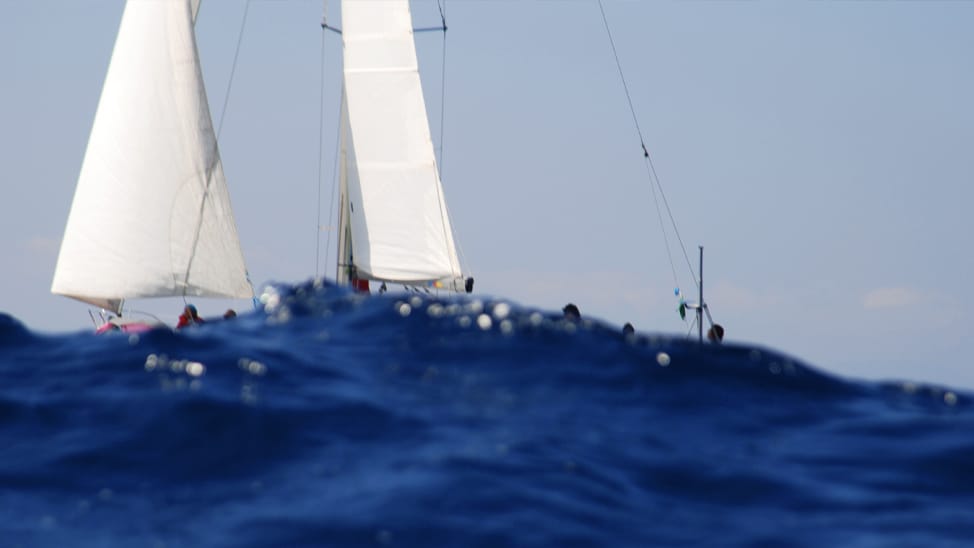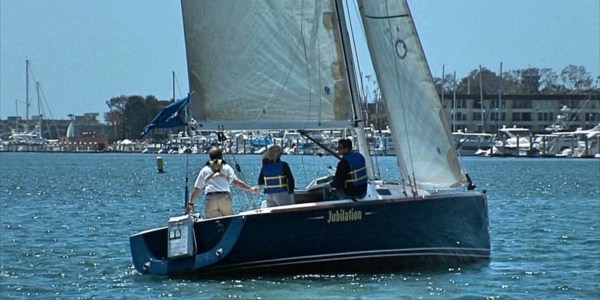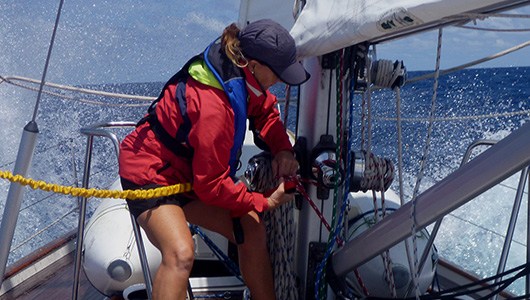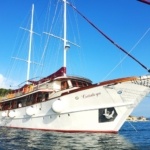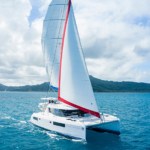Mal de mer is another way to say “seasickness.” It’s a particular kind of motion sickness that afflicts people traveling by water, and it causes dizziness and nausea (a word that actually means “seasickness” in Greek). Mal de mer is brought on by the rocking motion of a boat on the waves — although not everyone is affected by it. In French, mal means “bad” or “sick” and mer means “sea.” – Vocabulary.com
I have a son that would suffer from seasickness on the way to the boat and then on the boat — each and every time we went sailing. He got better. Soon it turned to every other time and then to once in four times and now it rarely happens. He is 17 and he grew up sailing.
You might ask, “Why did you keep sailing if it made him sick?”
Imagine a world where you don’t get to experience the feeling of the wind capturing the boat and dictating where you go. What if you never were able to experience the silence that comes from the ocean and the wind and the outdoors?
The real answer was that our son would get sick and then recover and enjoy the ocean. He loved to sail, it was just not without a price.
Thankfully, he was not alone, and there are ways to avoid or recover. Try these helpful hints and don’t let seasickness keep you from sailing.
What is Seasickness?
The National Oceanic and Atmospheric Service (NOAA) define Seasickness as:
“Seasickness is a result of a conflict in the inner ear, where the human balance mechanism resides and is caused by a vessel’s erratic motion on the water.”
National Oceanic and Atmospheric Service
Personally, I define seasickness as a conflict between my stomach and my body. Sure, some biology and chemistry make me feel sick but the issue seems to be some triggering effect that makes my stomach go haywire. It is not always a boat that is rolling around on confused seas.
My worse case of seasickness came on a SCUBA diving boat when the exhaust from the engine seemed to make me quite ill. Another case was while on a boat in the Florida Keys, the steering failed and we were forced to float around adrift for 3 hours. My last noticeable encounter with seasickness came after a long day on Jost Van Dyke in the British Virgin Islands. That one may be the result of a few too many Painkillers at the Soggy Dollar Bar.
Common Symptoms of Seasickness
- Cold Sweat
- Nausea
- Increase in saliva
- Turning pale or going green
- Hyperventilating
- Fatigue
How do you Prevent Seasickness?
- Hydrate – Dehydration can lower your body’s reaction to motion. Hence, too many alcoholic drinks often lead to dehydration, which will increase your chances of developing motion sickness symptoms. Wait for the extra cocktail until you get to shore and do not forget to drink water. Ginger Ale is a great way to help ease your motion sickness symptoms.
- Medication/Herbal – Plenty of sailors avoid seasickness by taking over-the-counter medications. Consider Dramamine or Bonine(Meclizine). Dramamine is an over-the-counter medication that is widely available. Read the instructions for dosage but it typically requires you to take the medication before you step off the dock. Meclizine is used to treat or prevent nausea, vomiting, and dizziness caused by motion sickness. If you prefer not to use medication, Ginger is an effective alternative trusted by many.
- Wear a Patch – Scopolamine is a prescription drug and works to combat the effects on the chemistry of the inner ear and motion sickness. These typically last longer than the pills.
- Fresh Air – Get out of the cabin and get some fresh air. So often people begin to feel the effects of the moti0n and quickly retire to their bunk. Bad idea, the rolling only gets worse down below and soon you are face to face with the demon that is the green monster of seasickness.
- Watch the Horizon – Does this work? Plenty of sailors including myself believe so and the soothing feeling of staring into the distance as well as the fixation on a steady point seems to have a positive effect on your stomach.
- Eat – This is tricky but you want to have something in your belly before the seas pick up. Crackers, pretzels, or nuts seem to do the trick just fine. We have peanut butter sandwiches on hand to keep just a tiny bit in our stomachs but not enough to ruin dinner.
- Avoid Bifocals/Progressive Lenses – If you can help it, don’t wear bifocals any longer than necessary because they can confuse your equilibrium if you’re looking through them often while moving.
American Sailing partner DAN Boater has some good advice for Seasickness.
I’m Seasick, Now What?
- Ginger – Ginger ale, ginger snaps, or ginger candies all do a great job of helping your body deal with motion sickness.
- Peppermint Candies – Mint is a remedy for seasickness so carry some peppermint candies with you. They also help with your breath in case you have to make a deposit in the ocean while underway.
- Saltine Cracker – The bland cracker has long been a remedy for me. It dries my mouth out to the point where I am uncomfortable but that lack of saliva helps with nausea. I combat the dry mouth with ginger ale and soon I am feeling better.
- Wind – The wind in your face always makes you forget about your belly aches. It takes a little time but relax, breathe and take in the wind. It might be the distraction or it might be the fresh air but this is a sure way to remedy the impending seasickness that is looking to spoil your sailing day.
- Don’t Look Down – I have explained that my youngest son would get seasick on a daily basis. Well, he would stick his head in a book and it would only get worse. Soon we convinced him that he should read less! (not the best advice) The simple idea is that you look out at the horizon and focus on a still object. This allows your inner ear to stop messing with your brain chemistry.
- Don’t Keep Asking – Don’t remind a person who is seasick by continuing to ask how they are feeling. They’ll let you know!
- Take the Helm – The brain works in mysterious ways – many people feel great relief once they grab the helm and refocus their minds on other things.
Don’t let seasickness ruin your ability to enjoy sailing. There are plenty of seasoned sailors who started out with complications from motion sickness and they have since earned their sea legs. There isn’t a one-size fits all solution, but most people seem to find their personal combination of preventive/responsive actions to keep from missing out on a day on the water.

